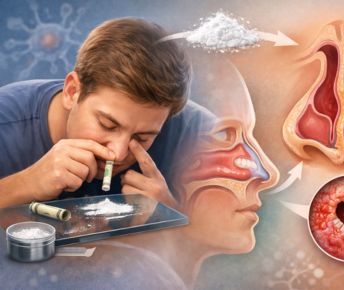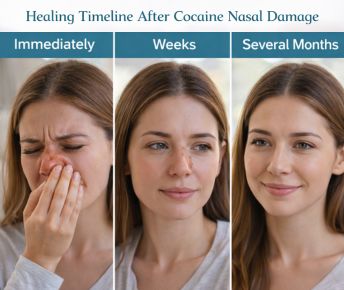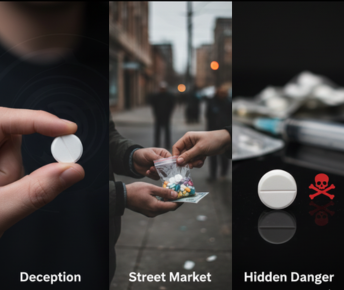Cocaine is a powerful stimulant notorious for its addictive nature. If you believe that you may have a test for cocaine coming up, knowing how long does cocaine stay in your system is crucial. In this blog, we'll explore the timelines associated with cocaine detection in the blood, saliva, fingernails, hair, and urine. We’ll also shed light on the enduring impact this drug can have on various bodily systems.
If you’re addicted to cocaine, you don’t need to suffer in silence. Contact Samarpan Recovery for information on how we can help you stop using.
How Long Cocaine Stays In Your System
So exactly how long does cocaine stay in your system? Various tests show the presence of cocaine for different amounts of time. Here are the most commonly used tests.
How Long Cocaine Stays in the Blood
The presence of cocaine in the blood is relatively short-lived, typically ranging from 15 minutes to a few hours. However, the metabolites produced when the body breaks down cocaine can be detectable in blood tests for up to two days after use.
How Long Cocaine Stays in Saliva
Cocaine can also be detected in saliva, offering a window into recent drug use. Saliva tests can identify cocaine within minutes to an hour after consumption, and the detection window typically extends up to two days. This method is often used in situations where immediate drug use needs to be assessed, such as roadside testing.
How Long Cocaine Stays in Fingernails
Fingernail testing provides a longer retrospective view of drug use. Cocaine metabolites can be incorporated into fingernails during growth, and as nails grow slowly, traces of cocaine can be detected for an extended period.
But how long does cocaine stay in your system when looking at your fingernails? Fingernail tests may reveal cocaine use for up to several months, depending on the length of the nail and the frequency of use.
How Long Cocaine Stays in Hair
Hair follicle testing is another method that offers a historical perspective on drug use. As hair grows, it retains metabolites, providing a record of substance use over an extended period. Cocaine can be detected in hair for up to 90 days or even longer.?
How Long Cocaine Stays in Urine
Urine tests are commonly employed to detect recent cocaine use. While the direct presence of cocaine in urine is short-lived, usually up to 2-3 days, the metabolites can be detectable for a longer period—up to several weeks for occasional users and potentially longer for chronic users. Urine cocaine tests are most commonly used by employers.
What Factors Affect How Long Cocaine Remains in Your Body?
The above times are estimates, and are affected by a number of different factors. How long does cocaine stay in your body also depends on the variables below.
Frequency Of Use
A person taking cocaine every day will have a greater level of cocaine residue in their body than someone who takes the drug once per month. This can affect how long cocaine will show up in your system.
Amount Used
Users of multiple grams per day are likely to have cocaine in their system for longer than people who take half a gram of cocaine per day. Note that neither of these amounts are healthy. If you are a daily cocaine user, you are risking addiction.
Method Of Use
Smoking and injecting cocaine both lead to faster onset of effects, but also lead to faster elimination when compared with snorting. Note that these ways of using cocaine can also be more dangerous than snorting.
Individual Metabolism
Metabolism varies from person to person. People with faster metabolisms process drugs more quickly. Genetics, age and level of health can also affect the cocaine excretion time.
Hydration And Urinary pH
Staying hydrated and having a more alkaline urine pH cause cocaine to be excreted more quickly.
Body Mass And Fat Percentage
People with higher body fat percentages tend to hold cocaine in their bodies for longer.
Kidney Or Liver Impairment
If your detoxifying organs are not functioning optimally, as is often the case with people who use cocaine regularly, the speed at which cocaine is processed through your body slows down.
How Can I Pass A Cocaine Test?
Some detox products claim to increase excretion by affecting urine pH and other methods. You should not rely on this. The only way of being sure you will pass a cocaine test is by not using cocaine.
What Are The Long-Term Effects Of Cocaine?
Chronic cocaine use wreaks havoc on the body. Here are some of the ways that cocaine can damage your body and mind in the long term.
Cardiovascular Issues
Cocaine is cardiotoxic, damaging the heart and cardiovascular system every time it is used. Cocaine users die earlier due to cardiovascular complications, including heart attacks.
Respiratory Problems
Cocaine constricts veins, arteries, and capillaries in the vascular system, even when it is not smoked. When someone smokes cocaine or crack cocaine, the harms done to the lungs are far greater.
Neurological Impairments
Brain damage can occur with chronic cocaine use. Cocaine can also cause damage to the dopamine system in the brain. Often, these changes are reversible following a prolonged period of abstinence, though in some cases cocaine can do permanent harm.
Mental Health Disorders
Cocaine can cause depression, anxiety, panic attacks and psychosis. Treatment for these mental health problems involves extended abstinence and psychiatric care. This is crucial, as mental illness can lead to future relapse.
Increased Risk of Infectious Diseases
Drug use makes your immune system perform suboptimally, and can cause people to engage in risky sexual behaviors, which increase the risk of STDs.
Gastrointestinal Complications
Cocaine use can cause ulcers, and give you problems with digestion, which can lead to further health complications.
Dental Problems
Smoking cocaine erodes the enamel on your teeth, and may cause your teeth to fall out eventually.
Increased Risk Of Stroke
Taking cocaine increases your risk of having a stroke six-fold for 24 hours after you take it. Smoking crack increases your risk eight-fold over the same time period.
Development Of Tolerance and Dependence
Cocaine is a horrifically addictive substance. If you become hooked on it, it can be incredibly difficult to stop. Once you have stopped, changes in your brain mean that relapse is very common, particularly within the first year of recovery.
Samarpan Recovery Cocaine Rehab
Cocaine addiction is a terrible affliction, but recovery is possible. At Samarpan Recovery, we help those suffering from cocaine dependence get back to a life that is not only free from drug use, but also is rich and vibrant with possibilities.
We have supported those with the most severe cocaine addictions to come back to life, and believe that everyone has the possibility of recovery, no matter the extent of your addiction.
Samarpan is a specialized international Substance Use Disorder (De-Addiction) and Process Addiction rehab in Pune, India that accepts a maximum of 26 clients. We only accept clients on a voluntary basis and have a highly structured program that encompasses the most effective approaches to Substance Use Disorder and addiction. The facility is set in the rolling hills Mulshi, with clients having either individual or shared rooms, in a modern resort-like facility, staffed by Internationally Accredited Professionals. Samarpan is fully licensed under The MSMHA and is also an accredited ;RSKI-CENAPS Centre of Excellence offering a program from 5 to 13 weeks.
If you or someone you care about is considering treatment for substance use disorder or process addictions, we can help. Contact us now on admissions@samarpan.in or phone/WhatsApp us on +91 81809 19090.
























 Yes, many offer serene environments and solid therapeutic frameworks. However, quality varies, so it’s essential to research accreditation, staff credentials, and therapeutic depth.
Yes, many offer serene environments and solid therapeutic frameworks. However, quality varies, so it’s essential to research accreditation, staff credentials, and therapeutic depth.




